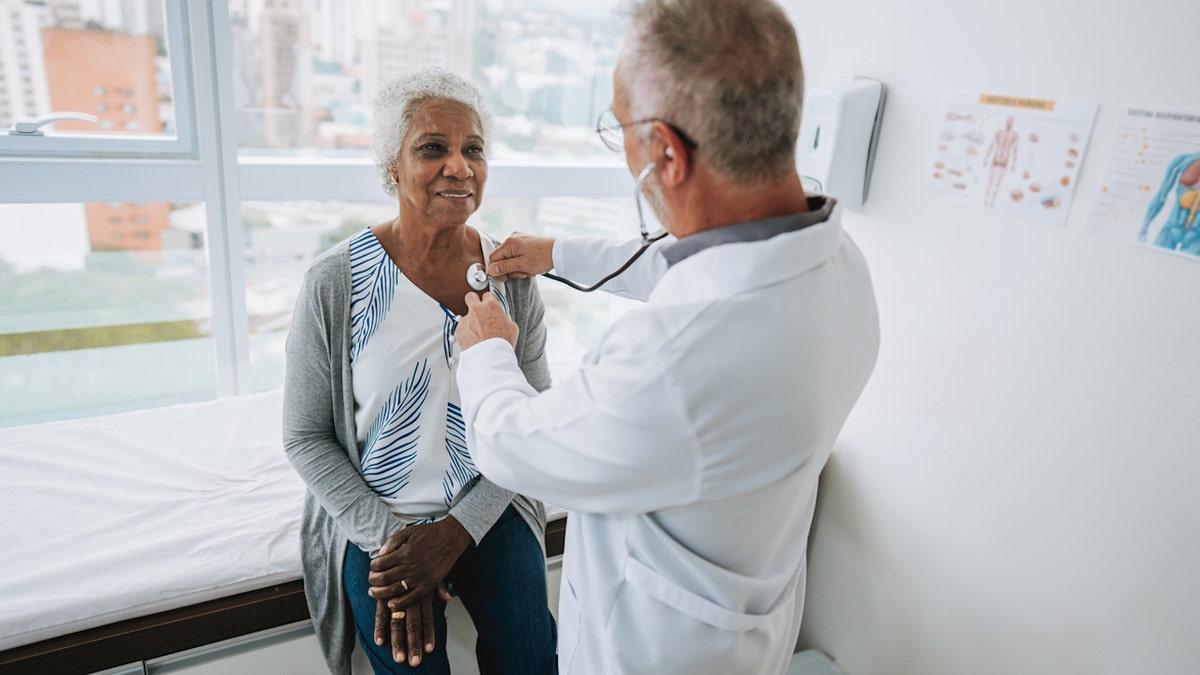Fox News Flash top headlines for February 13
Fox News Flash top headlines are here. Check out what's clicking on Foxnews.com.
People are curious about heart health — and for good reason.
Heart disease remains the leading killer of men and women in the U.S. — each year, around 695,000 people die from cardiovascular conditions, per the Centers for Disease Control and Prevention (CDC).
For American Heart Month, Dr. Martha Gulati, M.D., a leading Cedars Sinai cardiologist and president of the American Society of Preventive Cardiology, is sharing some of the most commonly googled questions about heart health, according to Google Trends.
Below are the questions — followed by the doctor’s answers.
Did you ever wonder about these issues? Take a look.

Heart disease remains the leading killer of men and women in the U.S. — each year, some 695,000 people in the country die from cardiovascular conditions. (iStock)
‘What is heart arrhythmia?’
Heart arrhythmia occurs when there is an abnormality in the rhythm of the heartbeat, said Gulati.
"This means your heart either beats too fast, a condition known as tachycardia, or too slow, also known as bradycardia, or irregularly," she told Fox News Digital.
Arrhythmias can be triggered by genetics, stress, pre-existing heart conditions, or lifestyle habits such as smoking and poor diet.
They can affect people of all ages, Gulati noted.
HEART DISEASE RISK INCREASES FOR YOUNG ADULTS WHO HAVE LOST A SIBLING, STUDY FINDS
"The most common type of arrhythmia is atrial fibrillation, also known as AFib," she said.
"AFib is an irregular and often rapid heart rate that can increase the risk of stroke, heart failure and other heart-related complications."
Around 12.1 million people in the U.S. are expected to have AFib by 2030, according to the CDC.
‘What are the symptoms of heart arrhythmias?’
Heart arrhythmias can have very different symptoms depending on the type of arrhythmia, the severity and the health of the individual, according to Gulati.
Symptoms of a cardiac episode can include chest pain, discomfort, fatigue and dizziness.
"Although these symptoms are alarming and can certainly induce anxiety, it’s important to know when they require an urgent hospital visit," the doctor said.

Heart arrhythmia occurs when there is an abnormality in the rhythm of the heartbeat. (iStock)
One challenge of arrhythmia symptoms is that they can come and go, she said.
"Sometimes, a patient makes an appointment or comes to the hospital after experiencing a cardiac symptom and, by the time they speak with a doctor, their symptoms have abated," said Gulati.
GOOGLE REVEALS THE TOP 10 HEALTH SEARCHES OF 2023 — AND EXPERTS ANSWER THEM
"It is difficult to treat patients who are no longer presenting with the symptoms they experienced, and it can be frightening or frustrating for patients who just want to understand what is going on with their bodies."
Medical-grade personal digital health tools can help break this cycle, she said; they allow patients to access accurate, real-time heart data that they can share with their physicians.

Medical-grade personal digital health tools allow patients to access accurate, real-time heart data that they can share with their physicians, a doctor said. (iStock)
"For patients, these tools can provide additional peace of mind and insight into their heart health," Gulati said.
"For health care providers, they offer a more comprehensive understanding of a patient’s condition and enable us to potentially implement more timely interventions."
‘What are heart palpitations?’
These are typically characterized by a rapid, fluttering or pounding heartbeat and can often be felt in the chest, throat or neck, according to Gulati.
Triggers of palpitations can include stress, anxiety, hormonal changes or stimulants like caffeine.
"Heart palpitations on their own aren’t always a cause for alarm," said Gulati.

Heart palpitations are typically characterized by a rapid, fluttering or pounding heartbeat and can often be felt in the chest, throat or neck. (iStock)
Patients can purchase home devices online that allow them to easily record symptoms, receive a reading and confirm whether they are experiencing a potentially life-threatening arrhythmia, the doctor noted.
"However, if you experience heart palpitations coupled with chest pain, fainting or severe dizziness, it is important to seek immediate medical attention," she added.
‘What causes heart arrhythmias?’
Heart arrhythmias can have a myriad of symptoms — plus a variety of causes.
Lifestyle habits such as activity level, diet or smoking can have a serious impact on overall wellness, particularly heart health, Gulati noted.
SLEEPING LONGER OVER THE WEEKEND COULD HELP PREVENT HEART ATTACKS, SAYS STUDY
"As health care providers, we stress the importance of a good diet and daily exercise, because it keeps your heart in good shape and reduces the risk of heart disease," she said.
There are some uncontrollable factors that can contribute to arrhythmias, however.
"One of these is abnormalities in the heart structure, which tend to be congenital, meaning something you’re born with," Gulati told Fox News Digital.
"Age-related changes can affect the way our hearts operate and the way electrical impulses flow through our cardiovascular system."
"Congenital heart conditions can impact the way electrical activity signals travel through the heart, which can then impact the heart’s rhythm."
Age-related changes can also make people more susceptible.

"If you experience heart palpitations coupled with chest pain, fainting or severe dizziness, it is important to seek immediate medical attention," a cardiologist said. (iStock)
"As we age, our hearts change," the doctor said. "These age-related changes, though natural, can affect the way our hearts operate and the way electrical impulses flow through our cardiovascular system."
It’s important to understand the specific factors that contribute to arrhythmias in order to get proper diagnosis and treatment, according to Gulati.
CLICK HERE TO SIGN UP FOR OUR HEALTH NEWSLETTER
"While lifestyle choices can influence overall health, managing aging and congenital or genetic factors often requires a multifaceted and personal approach," she said.
"The more proactive you are about your heart health, the better. Regular check-ups and monitoring can help identify and manage these factors."
‘What are arrhythmia treatments?’
Treatments for arrhythmia will differ depending on each individual’s symptoms and contributing factors, Gulati said.
"It’s important for your doctors to have access to as much information as possible so they can make the most informed decisions about your care," she said.

Treatments for arrhythmia will be different depending on each individual’s symptoms and contributing factors. (iStock)
Early detection and intervention can significantly impact the long-term prognosis and reduce the risk of complications, such as stroke or heart failure, the doctor noted.
"That’s why I stress the importance of providing real-time data to physicians about what you’re experiencing when you’re experiencing it," she said.
CLICK HERE TO GET THE FOX NEWS APP
"This not only fosters a deeper understanding of your unique circumstances and needs, but it also allows your doctor to tailor treatments based on day-to-day insights."


